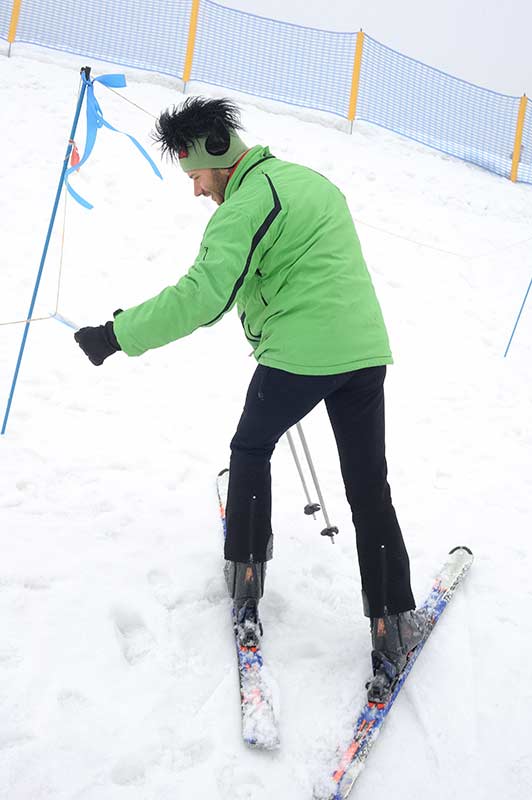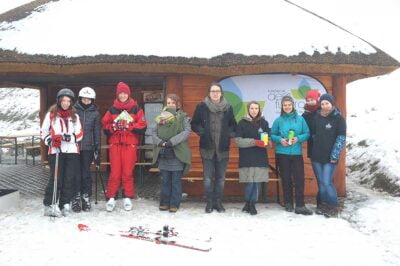Community project – “Skiers for the Climate”

Do you love skiing? Join the snow activities “Skiers for the climate”! Such a slogan resounded repeatedly on the Glass Mountain in Harbutowice near Krakow, where on Saturday, February 4, the Aeris Futuro Foundation organized, together with the ski resort, a winter happening dedicated to climate change.
“Skiers at the event participated in an educational climate slalom on the slopes, environmental quizzes with prizes, a competition aimed at the youngest participants, or screenings of the best films on climate change” – says Aneta Duch, event coordinator from the Aeris Futuro Foundation. “The event was meant to convince skiers that the fight against global warming is one of the most significant challenges of this century, and that the effects of climate change affect each of us directly, skiers included, since even the best cannons will not make snow on the slopes at positive temperatures” – Magdalena Waś of the Szklana Mountain ski slope explains.
Get involved in climate action, because everyone is paying the price of the lack of natural snow!
Developing a passion like skiing is becoming increasingly difficult and expensive:
- The number of days with natural snow cover is decreasing – global warming continues, leading to weather anomalies
- Artificial snowmaking is also not always possible – in order to produce and maintain artificial snow, a maximum ambient temperature of -1°C is required, and the occurrence of such days is sometimes very variable, which significantly limits the use of this method.
- The high price of snow – in total, the cost of a cubic meter of snow powder is 3-5 euros. Producing a layer half a meter thick on a kilometer-long, 60-meter-wide slope thus costs at least about 20-30 thousand at a time. Ski resorts in Tyrol spend as much as 160 000 000 euros on utilities alone in a single season. Fifty percent of the price of a skipass consists of the preparation and operation of the slopes. Another 25 percent is the cost of operating the queues.*
- Enormous amounts of energy are consumed – one hour of snowmaking on the 30-kilometer-long ski slopes consumes as much electricity as a family of four for an entire year! And it is energy production that is the main source of greenhouse gas emissions into the atmosphere, since electricity in most countries is produced mainly from coal.
- Excessively limited water resources are being used – for one cubic meter of snow it takes as much as approx. 400-500 liters of water. To produce artificial snow, 95 000 000 m³ of water is needed for just one ski season in the Alpine countries. This is equal to the total annual water demand of a city with a population of 1.5 million people.* Climate change and overexploitation of resources is leading to a lowering of the groundwater table and less water flow in surface watercourses.
Environmental problems due to lack of environmental awareness among Poles?
“Saturday’s happening also became a site for a clash with Poles’ lack of awareness of the desirability of making their own efforts to protect the environment. A large number of participants saw no connection between their choices or attitudes and their impact on the environment, including the climate. They even expressed a complete lack of realization as to who really “plays first fiddle” here – man or the environment, thanks to which we are able to survive as humanity” – explains Aneta Duch, coordinator of the event. “Have we managed to convince them? It is certainly very necessary to continue to make Poles aware that ecological attitudes are not a fashion, but a necessity!”
“It seems that the issue of climate change, like the problem of air quality quite recently, is not yet fully recognized and identified by the public” – explains Joanna Mieszkowicz – “The Aeris Futuro Foundation has been actively working on climate protection for more than 10 years, not only through forest offsets (Time for Forest program) and investments in renewable energy sources (Social Carbon Offset), but also reaching out with environmental education to various target groups – children, young people and employees of companies and institutions”.

One thing I think, something else I do…
Survey results show that most Poles believe that climate change: is occurring, is not natural, and is recognized by the scientific community. Climate change affects the environment as a whole, which leads to the fact that even people who are convinced of the reality of climate change may not engage in actions to reduce it (How to promote pro-environmental policies and renewable energy in Poland, compiled by WWF Poland Foundation, 2016). People focus on the situation here and now. If someone is well off, living a prosperous life and not experiencing environmental annoyances, they see no need to worry about it in the future. Another argument is that people receive too much information, among which it is difficult to choose the right ones, which also leads to environmental numbness.
For people who have not previously cared about the environment, engaging in environmentally friendly behavior involves changing habits and routines. Change, in turn, is naturally accompanied by uncertainty and a sense of risk about the consequences of that change. These risks can be financial, when a person fears that an investment in new solar panels, for example, will not pay off. Social risk stems from the fear of an unfavorable reaction from those close to them related to a commitment to environmentally friendly behavior. For example, colleagues at work may ridicule a person who segregates yogurt containers. The perceived psychological risk is associated with lowered self-esteem and self-confidence when important loved ones disapprove of pro-environmental behavior.
Join us
The education and information campaign will last until the end of the season, and we are already planning the next edition on a wider scale and hope that more ski resorts will join us. You are welcome too!








